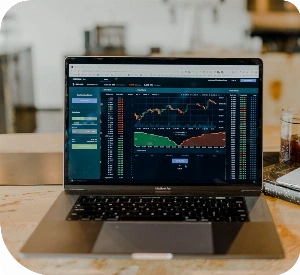Blockchain technology is getting progressively closer to being the leading one. From investigating the broad possibilities of blockchain technology toward discovering and developing actual solutions, logistics organizations, like many other businesses, are engaging in Blockchain rapidly expanding technology. One of the important elеmеnts in all fields of contemporary business is logistics, and it is on the rise nowadays. According to Transparency Market Research, the present market is about $8.1 billion dollars, but by 2023, it will be worth $15.5 billion dollars. Volumes, which were anticipated to be 54.6 billion tonnes in 2015, are expected to rise to 92.1 billion metric tons by 2024.
So how does blockchain transform supply chain management?
Blockchain is a revolutionary technology that transforms the economy and business processes within industries and logistics is no exception.
Let’s discover the ways blockchain is currently redefining supply chain management.
1. Inventory and Cargo Tracking
The supply chain is a complex system with numerous elements involved, the communication between which is mainly carried out through meetings, email, messages. A significant number of vehicles can be lost due to the fact that they are “out of sight” of accounting systems. Furthermore, correcting inaccuracies in calculations is time-consuming and expensive.
Blockchain can be used to create a unified digital document management system in the cloud, which allows supply chain participants to track the location of the cargo and their products in real-time. Walmart is already using this to supply mango, pork, and greens. Going forward, the largest chain retailer in North America plans to move all food supply chains to the Food Trust blockchain developed by IBM.
Nestle uses IBM’s Food Trust blockchain management to supply chains for food ingredients such as mashed potatoes, milk, and palm oil. In this way, Nestle shows customers what their products are made of.
2. Authentication and Quality Check
According to the Organization for Economic Co-operation and Development, in 2018 the global counterfeit market reached $450 billion, which is more than the GDP of countries such as Austria or Israel. Other studies show an annual loss of 1.6 billion tons of food (worth about $1.2 trillion), 40% of which is spoilage during transportation. At the same time, according to CDC estimates, a significant part of this spoilage ends up on the consumer’s table, which in the United States alone leads to hospitalizations and deaths.
Blockchain technologies allow tracing the origin of goods from a store to a specific manufacturer. This data is plausible since each batch of goods (or each individual product, if it’s something large or expensive) is equipped with a tag that constantly monitors the location of the goods and interactions between participants in the supply chain.
Everledger, an independent technology company, has created a blockchain solution for the diamond industry. The registry stores data on the origin of the gem, color, clarity, cut, carat weight, certificate number, and other information regarding jewelry pieces.
3. Improving Freight and Delivery
Shippers and consignees, third-party logistics, carriers, government agencies, banks, adjusters, and many others are all involved in a conventional delivering case. Furthermore, they send about 200 paperwork communications throughout the delivery of only one consignment of goods: proof of delivery, invoicing, bills of lading. Such paperwork's service fee is around $300, or around 10-15% of the shipment cost. IBM estimates blockchain technology in the supply chain could save the logistics industry $38 billion a year. This will be possible with smart contracts that automate most of the workflow and business processes. In addition, the distributed ledger will reduce errors, shorten delivery times and allow fraud to be detected.
Maersk has partnered with IBM to launch TradeLens, a logistics system based on the Hyperledger Fabric blockchain (created by the Linux Foundation) to track shipping freight traffic and exchange customs and financial information between supply chain participants.
4. Billing and Payment
As we noted above, sending cargo from one country to another creates a supply chain involving about 30 organizations that interact with each other more than 200 times. These interactions are mainly billing and payment. With the traditional approach, these financial transactions are complex, require a lot of time and bureaucratic effort, which results in manipulation, fraud and generates a lot of errors.
The technology makes it possible to automate the process of invoicing and their payment by linking these calculations to the performance of a certain action, for example, making a record of the completion of the shipment of cargo across the border.
Blockchain in the supply chain:
- ensures the accuracy and compliance with the timing of financial calculations;
- reduces the need for paperwork and intermediaries, which are needed to guarantee honesty and compliance with transactions, which will greatly reduce costs;
- helps to prevent fraud or promptly identify it;
- reduces the number of errors (for example, incorrect company name or account number);
- speeds up all processes in general.
5. Freight Market Launch
The freight market today is expensive and confusing. There are no important implications or norms in place to govern the stakeholders' responsibilities for transaction compliance and explicit or implicit fraud. Additionally, this market is opaque, which frequently results in unpredictably fluctuating freight costs in the lack of large changes in market conditions. Blockchain technology and smart contracts can be used to create a fair marketplace where companies can hire freight carriers in the shortest possible time on clear and transparent terms. At the same time, since all the terms of the contracts will be pre-written in smart contracts, the level of responsibility of companies will increase, so it will occur immediately in an automatic manner, and not after long negotiations.
ShipChain is working to improve logistics using blockchain technologies. The system uses open-source smart contracts that can be easily integrated into almost all existing blockchain-based logistics solutions. These contracts are created to support logistics operations and aim to create a decentralized freight market, as well as track errors and prevent theft.
6. Blockchain in the Supply Chain Improves Transparency
A big problem in supply chains is the low level of reliability of verifiable information, which is a direct consequence of the lack of transparency in the industry. For example, due to the lack of transparency in the formation of the cost of transportation, many companies overpay for the delivery of their goods to the consumer, and due to the inability of the shipper to control the delivery process.
Since all data is stored on the blockchain, each participant in the supply chain can check the information for each ship, container or cargo at any time, which reduces discrepancies in the documentation.
How does transparency help:
- Blockchain supply chain management allows parties to see evidence of the counterparty’s past performance, including delays in delivery or payment.
- It reduces the likelihood of discrepancies in the documentation, like the misinterpretation of the delivery time.
- Transparency provides an opportunity to control the delivery process at the micro-level, which will reduce the level of fraud and inaccuracies.
7. Dispute Resolution
Moreover, using immutable data and real-time cargo information, disagreements may be settled considerably faster. Many disputes may now be settled in minutes using only accurate data due to automation. It would also assist businesses in resolving client issues. Every day, payment disputes in the logistics industry freeze more than $140 billion in transactions. For example, this happens when the shipper tells the shipping company that it sent the wrong invoice, or when the parties forgot to indicate who pays fees.
If all conditions and actions are recorded on the blockchain, this eliminates most of the problems in the event of disputable situations. The parties to the conflict can check the necessary data in the blockchain and, in accordance with the contract, decide who is right and what to do.
Where do you go from here?
Blockchain is the technology that organizes the workflow of complex networks. More than a decade ago companies have started a long transformation journey due to technological breakthroughs in automation opportunities.
inVerita is listed among the best logistics software companies in Ukraine with huge experience in building custom logistics solutions. If you want to know how to implement blockchain in the supply chain, please contact our team and get a free consultation.






